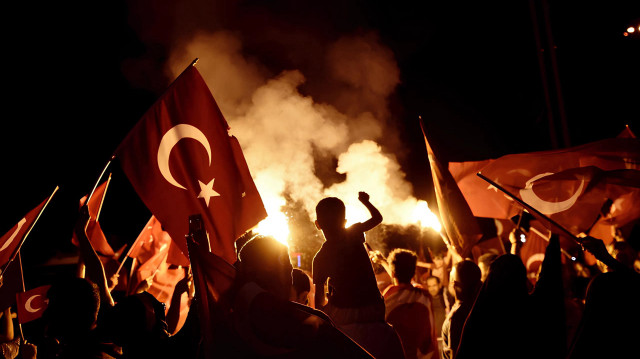
Türkiye's post-coup transformation over the past nine years reflects its successful shift from political turmoil and military interference to stability, democratic reform, and rising global influence through institutional restructuring, counterterrorism, economic development, and energy innovation.
Today marks the ninth anniversary of the failed coup attempt that took place in Türkiye on July 15, 2016—an attempt that sought to drag the country back to the era of military coups, the dominance of shadowy lobbies, and networks of corruption tied to centers of influence within and outside the military establishment.
However, the Turkish people, with their will and awareness, stood as a solid barrier against this coup and opened the door to a profound political transformation, later known as the “silent revolution,” which put Türkiye on the path of stability and firmly established the foundations of a modern civil state.
The coup attempt marked a turning point in modern Turkish history, leading to a collective realization of the importance of safeguarding the will of the people and protecting democratic gains. Since that time, the state has launched comprehensive reforms, restructuring the security and military institutions, and dismantling parallel structures—most notably the terrorist "Gülen" organization, which was proven to have played a direct role in the coup attempt.
Türkiye has succeeded in regaining full control over its institutions and established the principle of the military’s subordination to civilian political authority—one of the most important achievements of this new era.
One of the most prominent challenges Türkiye has faced on its path to stability has been the issue of terrorism, particularly the Kurdistan Workers’ Party (PKK). Over the years, the group has been subjected to focused security operations both domestically and abroad, which included neutralizing its senior leadership and dismantling its cells, especially in northern Iraq and northern Syria.
In a remarkable development, clear signs have emerged indicating that elements of the group are beginning to lay down their arms—an apparent admission of the failure of the armed struggle and a recognition of the futility of violence as a means of achieving demands. This transformation is a watershed moment in Türkiye’s political and security landscape and paves the way for closing this historic file that has burdened the state for decades.
This has coincided with the launch of ambitious development projects in Kurdish-majority areas, aimed at enhancing national integration, improving infrastructure, and creating job opportunities— steps that have reduced grassroots support for the group and reinforced a climate of peace and stability.
Despite regional and international challenges, Türkiye’s development momentum has not halted. The government opened the doors to investment, encouraged both local and foreign entrepreneurs, and launched a series of massive infrastructure projects.
Today, Türkiye is among the leading countries in road network expansion, bridge construction, and port development. Landmark projects such as Istanbul International Airport, the new Istanbul Canal plans, and high-speed rail networks have turned the country into a strategic logistical hub connecting continents.
Türkiye now seems poised to crown these achievements with major natural gas discoveries in the Black Sea and promising exploration projects in the Eastern Mediterranean. These developments strengthen its energy security, reduce dependence on foreign sources, and position it as a key player in the regional energy market.
At the same time, Türkiye is rapidly advancing in the field of clean and renewable energy, becoming one of the leading nations in solar and wind power generation—part of a strategic vision aimed at achieving sustainability and economic independence.
Despite the regional and global crises surrounding it, Türkiye continues its confident march toward the future. The failed coup experience became a pivotal moment that the Turkish leadership turned into a historic opportunity to rebuild the state on firm foundations of national sovereignty, economic development, and political stability.
This is the story of a nation that did not surrender—but rather, confronted challenges, invested in its unity, and mobilized its own capabilities. Today, it stands as one of the most prominent and influential countries in its regional and international spheres.
Author:
Talal Jamel, Yemeni Diplomat







